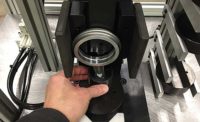WASHINGTON-The National Association of Manufacturers(NAM)has come out in support of a new free trade agreement between Korea and the United States. But, there are prominent members of the U.S. manufacturing community, including the Big Three automakers, who say Ambassador Susan Schwab and other U.S. negotiators gave away more than they got.
“The negotiators put in a Herculean effort to obtain a comprehensive agreement that covers a broad array of issues important to manufacturers, and did so within a very tight time limit, ” says NAM President John Engler. “While we need to study the details, initial reports indicate that many manufacturers will benefit from the most significant trade agreement in decades.”
Ford Motor Co.(Dearborn, MI), however, says that while it appreciates the close consultations it has enjoyed with U.S. trade representatives it is “extremely disappointed” with the outcome of the negotiations.
“Ford Motor Co. has supported every U.S. free trade agreement. As a company that operates and competes in 200 markets globally, we see the real and tangible benefits of free trade,” says Ford Vice President for international governmental affairs, Steve Biegun. “Unfortunately this agreement, as we understand it, will not open the Korean market to free trade in automobiles. The Korean government missed its last, best chance to undo the protectionist policies that over the past two decades have kept the Korean auto market off limits to all manufacturers-U.S., Japanese and European. This agreement should not be approved by the Congress in its current form.”
In an official statement,Chrysler Group(Auburn Hills, MI) says it is also “disappointed” with the new trade agreement. “We have been working with the administration since the beginning of the talks to reduce barriers to the Korean auto market, which is the most closed market in the industrialized world. While we have supported every free trade agreement negotiated by the U.S. government, we will not support this agreement as we currently understand it.”
In defending its position, NAM says the tentative deal would eliminate tariffs on 95 percent of consumer and industrial products between the countries within 3 years. Currently, Korean industrial tariffs range as high as 8 percent, making market access extremely difficult. According to NAM, Korea represents a $3 billion import market, of which U.S. manufacturers currently only posses 11 percent.
“The agreement appears to provide higher standards of protection for U.S. investment in Korea, including in the important area of resolving disputes between government authorities and foreign investors,” Engler says. “Similarly, high standards of protection for intellectual property rights give confidence to U.S. manufacturers and encourage more trade and business partnerships with Korea.
“We wanted an agreement that results in a growing U.S. share of Korea’s imports, and many of the aspects of the agreement announced so far appear to help achieve that objective,” Engler says. “Naturally, we need to review the entire agreement with all the annexes and side letters before determining whether it will, indeed, result in the benefits we all hope for. Whether the agreement tackles key concerns that have been expressed by individual manufacturing sectors requires further analysis and consultations with our members.”
Recommended Articles
Related Articles
×
Never miss the latest news and trends driving the manufacturing industry
Stay in the know on the latest assembly trends.
JOIN TODAY!Copyright ©2024. All Rights Reserved BNP Media.
Design, CMS, Hosting & Web Development :: ePublishing


